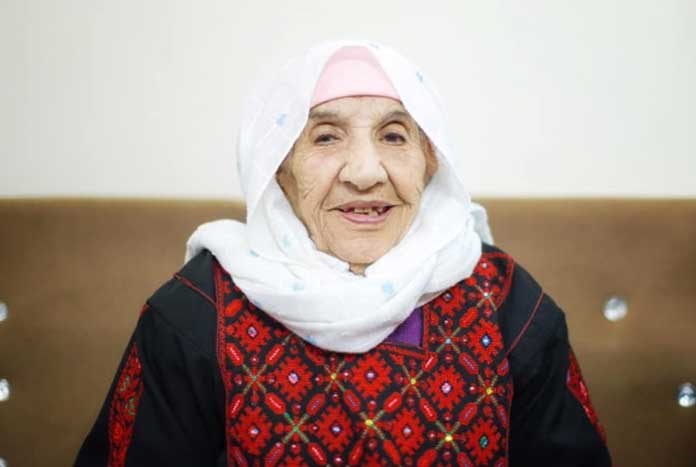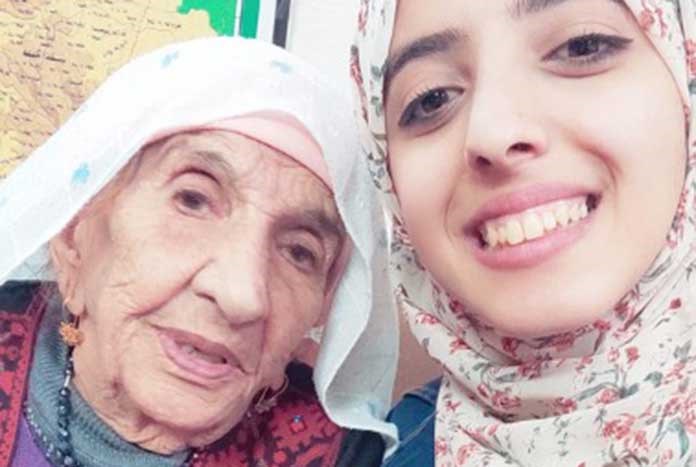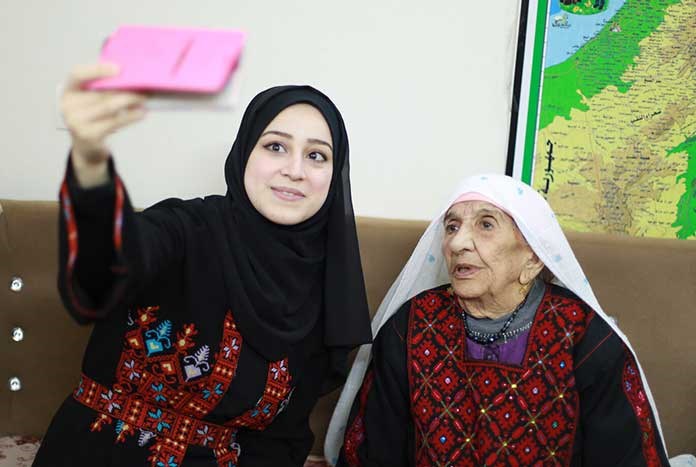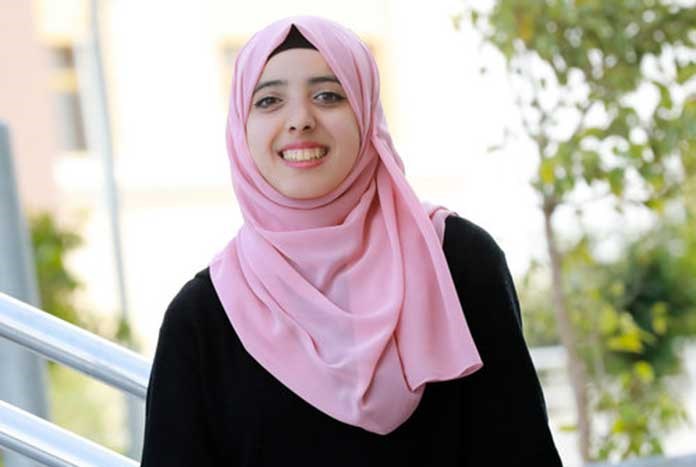Subscribe to ‘Words Of Hope’
Get our emails direct to your Inbox with updates about all our campaigns, trips and events.
Growing up with Sitti — Asmaa Tayeh from We Are Not Numbers in Gaza writes about losing her 95-year old grandmother.

Introduction
For April’s edition of First Of The Month, we’re pleased to be able to share a very personal piece of writing by Asmaa Tayeh from Gaza. Asmaa works with We Are Not Numbers, an organisation created to share the stories emerging from young people in Gaza.
It was founded in early 2015 by American journalist, Pam Bailey (then based in Gaza), to give young Gazans a platform to share their stories, particularly with western audiences, and to challenge the dominant narratives that portray them as numbers, not individuals.
As part of this the project provides support for young people in how to deliver their stories through writing and journalistic skills, film, sound recording and the use of social media. They also have a strong bias toward creating opportunities for young women in Gaza, as the public space available to them is very limited.
Some of you may remember Asmaa from our ‘Virtual Tour of Gaza’ webinar in February, when she introduced and shared with us a short film that she had produced with the We Are Not Numbers team especially for the webinar. In it, she filmed her grandmother, Sitti, being interviewed by fellow team member Ola.
It’s particularly poignant to share this piece of writing with you now, as Sitti died just 8 days after filming. So for this edition of First Of The Month, Asmaa shares her memories of her with us. We hope you enjoy it.
— — — — — — — —
Growing up with Sitti
The first thing my brother said was, “Your beloved is gone.” Those words haven’t stopped bubbling in my head ever since. They convey how much I loved her, how much her stories meant to me and how precious her lessons will always be to me.
The News
It was a Thursday. I had woken up a bit late and was getting ready to go to work. I was excited about my team’s plans to share a lunch of grilled chicken to welcome back friends who had finally returned to Gaza after being trapped in Egypt for three months due to the closure of the border. I closed the door to my bedroom and was about to go downstairs when my mother received a call. I heard her saying, “Is that real? May her soul rest in peace!” She hung up and I stood in front of her. I asked: “Is that my grandma?” She said, “Yes, she has just passed away.”
It had been just a little over a week ago since we had learned that the pain we thought was a stomach ache was actually colon cancer. The doctors said the tumour had to be removed immediately, although the surgery could be very dangerous considering her old age and low stamina.
The first thing my brother said was, “Your beloved is gone.” Those words haven’t stopped bubbling in my head ever since.
My beloved Sitti (grandmother) was 95! She underwent the surgery, staying four days in the hospital before returning home. She seemed fine, but she was not. We knew, of course, that at her age every day was a gift. But at the same time, my brain had trouble processing the fact that we had lost her. She had defied all the odds to stay with us for so long. A survivor of the Nakba, she was a symbol of Palestine!
I collapsed, crying, until I closed my eyes to sleep around 11 p.m. Scrolling through my mind were her words, stories, facial expressions, prayers, favourite belongings and everything that makes her so special to my heart.

Sitti and Asmaa: the last selfie, taken eight days before her death.
— — — — — — — —
I also knew I had to write a story about her life, to honour her memory and document her existence for her grandchildren and mine. So here I am, spending my afternoon writing, cloaked in the red-and-black blanket she gave me, trying to narrate her story the best I can.
She had defied all the odds to stay with us for so long. A survivor of the Nakba, she was a symbol of Palestine!
Her childhood
My grandma was given the name Latifa, which means “kind” in Arabic and she grew into it every day. (Ironically, she hated her name and told her grandchildren not to name their daughters after her because she thought it would bring bad luck.)
She often told us tales of how, as a young girl she would wander across the plains of her family’s farm in Beit Daras, wearing a long, embroidered dress with the colours of the Palestinian flag and her silky, black hair covered by a long, white scarf. Beit Daras is located 32 km northeast of Gaza and her father, Hassan, was one of the richest farmers in town; he owned many dunums and various kinds of livestock, including cows, sheep and camels.
Unlike other farmers, he did not have sons to help him plant, harvest and milk the cows. It didn’t matter, though, because he had a strong daughter who loved to work with her father more than helping her mother in the house. Latifa knew all of Beit Daras by heart and was happiest when she was running across the plains or traveling with her father to buy or sell goods.
Before she turned 17, she married a relative, Rebhi. A year later, she gave birth to their first child, Hosni. Everyone called her Om (mother of) Hosni. She thought that would forever be her happy life, until Israeli soldiers attacked their town, killing or forcing the residents to flee. Those black days of 1948 are today known as the Nakba — ‘catastrophe’.
She often told us tales of how, as a young girl she would wander across the plains of her family’s farm in Beit Daras...
Clutching Hosni, Latifa and her family fled from one town to another until they landed in Gaza’s Jabalia Camp, which was nothing but masses of tents supplied by the United Nations. In the years following, she moved at least 12 times with her growing family of 10. In 2014, during Israel’s last war on Gaza, her house was destroyed by Israeli warplanes. She was injured and fled to our house, spending the 51-day attack telling me stories that would fill a book.
Growing up with Sitti
When I was 4, my mother was hospitalised in Tel Aviv for four months; Sitti looked after us children while my father worked in the occupied Palestinian territories that were now Israel. She was our second mother, cheerfully looking after five boys and two girls despite her already advanced age (73). I became addicted to her tales and asked for more when the electricity went off and I couldn’t watch TV.
I never stopped asking her to share memories about her original town of Beit Daras. With every story, she made me feel more Palestinian and eager to see my homeland. She ended each story by saying, “May we go back some day and I will show you my father’s lands. You will love them and their crops. Our crops had real taste, not like the crops of these days!”
Whenever she asked me to buy her anything, she would compare it to that of her hometown, saying that the Israeli occupation deprived her and us of all that is beautiful. For instance, she recently asked us to buy her dried grapes. Each family member brought her different, expensive types, but she didn’t like any of them: “The dried grapes of Beit Daras were way better and more delicious. This generation is good at technology, but not at making original Palestinian food,” she said.
I became addicted to her tales and asked for more when the electricity went off and I couldn’t watch TV.
When I grew up and became a “bride,” as she liked to call me, we became closer. She visited overnight for a few days every month and asked about everything I was doing: my studies, my work and — of course — my marriage plans. I loved to provoke her by saying things she hated (like that I wanted to travel instead of getting married in Gaza), and she liked to vent to me and share her secrets after midnight, when no one was listening.
Everyone was jealous when Sitti would say, “Asmaa! It’s time to drink tea! Yalla, go and make me some. Everyone makes me tea but yours is my favourite.” My mother asked me for my secret recipe and I never shared it. But I also believe my grandma only liked my tea so much because she wanted me to stop working on my laptop and drink it with her so I’d talk to her.
We say goodbye
For more than 70 years, my grandma Latifa struggled to deal with her trauma after she was forced to immigrate under fire. She struggled again when she received news, 30 years ago, of the murder of her first child Hosni by Israeli soldiers. He was only in his 20s. And then she struggled so much more as her grandchildren grew up and encountered struggles of their own, as the Israeli occupation continued.
She felt each of our pains as her own. Even when my three brothers, along with at least 10 more grandchildren and relatives, immigrated to Europe to seek a better life, she supported them morally and financially and never stopped praying for them. And for that, we are all grateful.
For more than 70 years, my grandma Latifa struggled to deal with her trauma after she was forced to immigrate under fire.
In Islam, it is known that some people know that they are about to die, that God loves them and that they are going to heaven. My aunts tell me that when my grandma came home from the hospital and slept in her bed, she looked at the ceiling and for hours described things only she could see: “I see gold. So much of it. And there is the prophet Mohammed. He is looking at me, smiling at me. I am going there with him.” Her words give me a warm feeling of reassurance that she was at heaven’s gate.

Sitti Selfie: Sitti poses with Ola from We Are Not Numbers, whose own grandmothers died before she was born.
— — — — — — — —
I still cannot believe that “my beloved is gone,” but I am happy I lived so many precious memories with her. Whenever we shared stories and laughter, I secretly recorded her for hours on my mobile phone so I could replay them when she is gone. (I knew this day was coming.) And whenever I had a chance, I asked her to take a selfie with me.
I was so proud of her that I introduced her to my foreign friends when they visited my house. She never stopped asking about and praying for them, although she may have only met them once. And she was filled with pride as she told my uncles and cousins how I worked to share Palestinian history with others. But the most remarkable of my attempts to document her life is a collaboration I did during my work at We Are Not Numbers with Amos Trust. As I led a virtual tour to Jabalia Camp, I included a visit to my uncle’s house where my grandma lived.
We shot the video for the tour eight days before her death. Our video presenter and fellow We Are Not Numbers (WANN) member, Ola, asked about her age and she answered: “Some say 90 and some say 95, but I hope I will die soon. I am done with this humiliating life. I lived so much and cannot take it anymore.”
Whenever we shared stories and laughter, I secretly recorded her for hours on my mobile phone so I could replay them when she is gone. (I knew this day was coming.)
I asked her to answer the question again without wishing to die, saying, “You cannot die. You will live until you return to Beit Daras and make us maftool, the Palestinian dish we are famous for.” But I never thought I would lose her so soon. If I had known, I would have given her a long hug, although she hated hugs.
I am happy I was able to show her off to 500 people from around the world, although she was never able to see the resulting video and hear how much everyone loved her smile. I am grateful to Amos Trust and We Are Not Numbers, two platforms that allowed me to talk about her in webinars and my essays.
They make it possible for Palestinian youth, like me, to tell the stories behind the numbers. And today’s number is 95 — 95 years of, yes, misery, pain and loss; but also happiness, joy and laughter.
Asmaa Tayeh
— — — — — — — —
About Asmaa

Asmaa Tayeh from We Are Not Numbers in Gaza.
— — — — — — — —
After studying English literature at Al-Azhar University, Asmaa first volunteered and was then hired as the Social Media Coordinator for We Are Not Numbers in Gaza where she was later promoted to Operations Manager.
To Asmaa, communication and writing are the strongest tools for storytelling — a mission to which she has dedicated herself. She also works as a manager for a Gazan rock band called Osprey V, and is a social media consultant for different NGOs.
You can read Asmaa’s original article on the We Are Not Numbers website. You can follow We Are Not Numbers on Twitter, Facebook, Instagram and YouTube.
— — — — — — — —
More First Of The Month
Other editions of our First Of The Month essays are available to read and download from here.
Words of Hope E-news
Sign up to receive our regular ‘Words of Hope’ emails and keep up to date with all the latest Amos news and information, including details of our trips and events, news from our partners around the world, and all of our campaigns.
Online reflection
Join us for ‘Words of Hope’ online every Tuesday at 5pm — simply click here to join us a few minutes beforehand.
Amos Trust
7 Bell Yard, London
United Kingdom
WC2A 2JR
Telephone:
+44 (0) 203 725 3493
Email:
[email protected]
Registered Charity No.
1164234

This item has been added to your shopping basket. Please click on the Checkout button below where you can choose your quantity.
Continue shopping Checkout Close